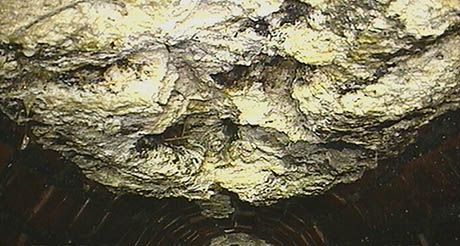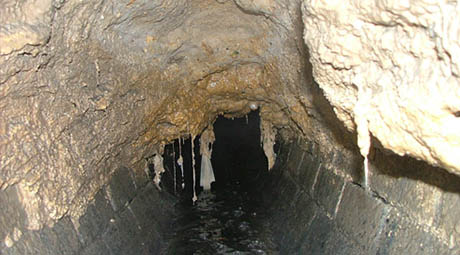The past week has brought two intriguing updates from London’s subterranean infrastructure of excretion. In a triumphant press release, Thames Water announced the removal of the world’s largest fatberg — a sewer-blocking, bus-sized lump of congealed cooking oil and wet wipes — from the drains under London Road in Kingston, Surrey.

IMAGE: The UK’s biggest fatberg. Photo: CountyClean.
According to Gordon Hailwood, waste contracts supervisor for the city utility:
While we’ve removed greater volumes of fat from under central London in the past, we’ve never seen a single, congealed lump of lard this big clogging our sewers before.
The sewer was almost completely clogged with over 15 tonnes of fat. If we hadn’t discovered it in time, raw sewage could have started spurting out of manholes across the whole of Kingston.
Food fat and moist wipes — the two main culprits in what Thames Water calls “sewer abuse” — cause more than 40,000 blockages a year under London, at a cost of more than £1 million per month.

IMAGE: Fatbergs (and fat stalactites) in a London sewer. Photo: Thames Water.
While the utility struggles to reduce wrongful flushing with its “Bin It — Don’t Block It” publicity campaign, it is also tackling the problem from the other end. When the world’s largest fat-burning power station opens in Beckton in 2015, Thames Water has committed to supplying half of its fuel, in the form of thirty tonnes a day of fat, oil, and grease (‘FOG’) “harvested from ‘fat traps’ in restaurant kitchens and from pinch-points around the capital’s sewer network.”

IMAGE: “Bin It — Don’t Block It” is Thames Water’s campaign to end “sewer abuse,” complete with primary school activities.
Meanwhile, London’s head “flusher,” Rob Smith, whose intimate knowledge of London’s chicken shop geography and cleaning routines we admired on Edible Geography in January 2011, draws on his unique perspective on the city’s digestive processes to reflect on changes in British eating habits in The Economist.
Among the news of drastic declines in green vegetable consumption (down by fifty percent since 1974, to under 200 grams per week) and a wholesale rejection of Brussels sprouts (down by four fifths), The Economist reports that national mealtimes are no longer clearly defined, with one study showing that “at no point in the day were as many as 20 percent of Britons eating.”
“Over the years, peaks in sewage flow have greatly diminished,” Rob Smith confirms: our continuous low-level flushing a testament to our disordered dining habits.
NOTE: Fatberg link via @Londonist.
